Psychology: Examining Young Adult Choices via Developmental Models
VerifiedAdded on 2023/04/07
|14
|3258
|390
Essay
AI Summary
This essay examines the decision-making processes of young adults through the lens of psychological theories, primarily Erikson's Theory of Psychosocial Development and Vaillant's Model of Adult Development. It delves into Erikson's stages of identity vs. role confusion and intimacy vs. isolation, highlighting the impact of social media, sexual identity development, and body image on adolescent choices. The essay also explores Vaillant's model, emphasizing the importance of identity development, intimacy, and career consolidation for successful aging. The analysis covers both positive and negative decisions made by young adults, linking them to developmental challenges and potential consequences such as social isolation, addiction, and mental health issues, while also highlighting the significance of education and healthy relationships in fostering positive psychological development. Desklib provides a platform to access this assignment along with a wide array of study resources including past papers and solved assignments.
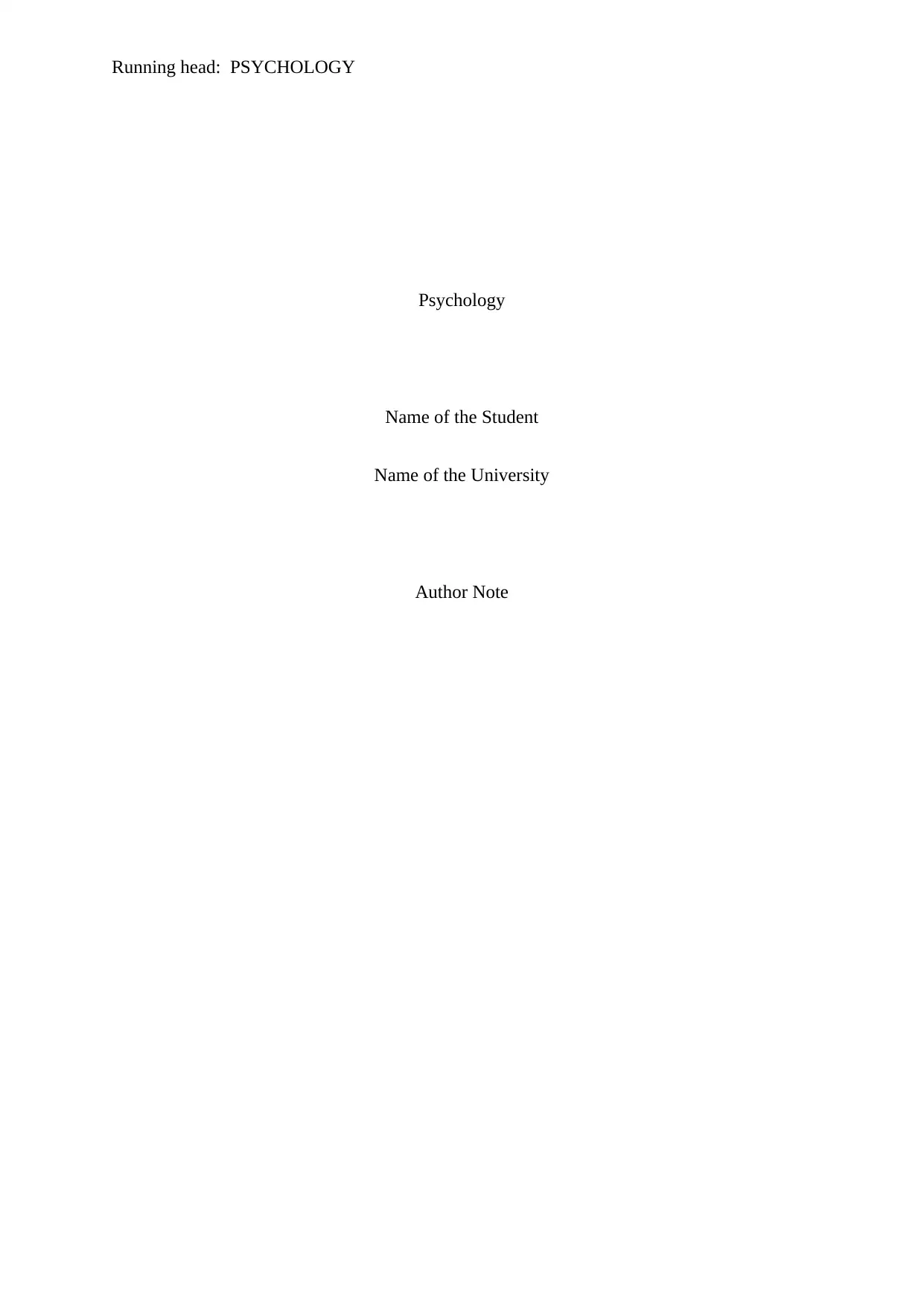
Running head: PSYCHOLOGY
Psychology
Name of the Student
Name of the University
Author Note
Psychology
Name of the Student
Name of the University
Author Note
Paraphrase This Document
Need a fresh take? Get an instant paraphrase of this document with our AI Paraphraser
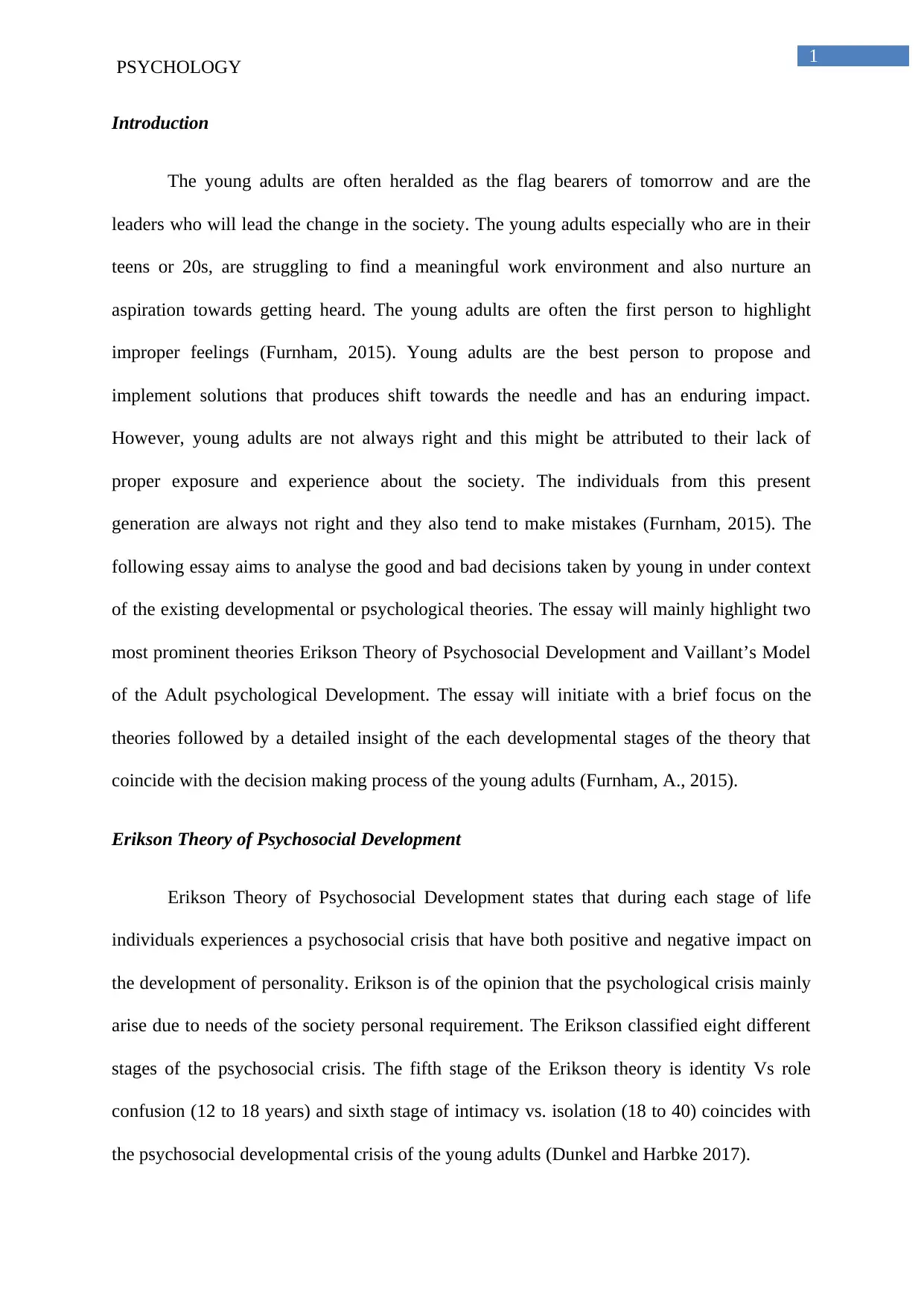
1
PSYCHOLOGY
Introduction
The young adults are often heralded as the flag bearers of tomorrow and are the
leaders who will lead the change in the society. The young adults especially who are in their
teens or 20s, are struggling to find a meaningful work environment and also nurture an
aspiration towards getting heard. The young adults are often the first person to highlight
improper feelings (Furnham, 2015). Young adults are the best person to propose and
implement solutions that produces shift towards the needle and has an enduring impact.
However, young adults are not always right and this might be attributed to their lack of
proper exposure and experience about the society. The individuals from this present
generation are always not right and they also tend to make mistakes (Furnham, 2015). The
following essay aims to analyse the good and bad decisions taken by young in under context
of the existing developmental or psychological theories. The essay will mainly highlight two
most prominent theories Erikson Theory of Psychosocial Development and Vaillant’s Model
of the Adult psychological Development. The essay will initiate with a brief focus on the
theories followed by a detailed insight of the each developmental stages of the theory that
coincide with the decision making process of the young adults (Furnham, A., 2015).
Erikson Theory of Psychosocial Development
Erikson Theory of Psychosocial Development states that during each stage of life
individuals experiences a psychosocial crisis that have both positive and negative impact on
the development of personality. Erikson is of the opinion that the psychological crisis mainly
arise due to needs of the society personal requirement. The Erikson classified eight different
stages of the psychosocial crisis. The fifth stage of the Erikson theory is identity Vs role
confusion (12 to 18 years) and sixth stage of intimacy vs. isolation (18 to 40) coincides with
the psychosocial developmental crisis of the young adults (Dunkel and Harbke 2017).
PSYCHOLOGY
Introduction
The young adults are often heralded as the flag bearers of tomorrow and are the
leaders who will lead the change in the society. The young adults especially who are in their
teens or 20s, are struggling to find a meaningful work environment and also nurture an
aspiration towards getting heard. The young adults are often the first person to highlight
improper feelings (Furnham, 2015). Young adults are the best person to propose and
implement solutions that produces shift towards the needle and has an enduring impact.
However, young adults are not always right and this might be attributed to their lack of
proper exposure and experience about the society. The individuals from this present
generation are always not right and they also tend to make mistakes (Furnham, 2015). The
following essay aims to analyse the good and bad decisions taken by young in under context
of the existing developmental or psychological theories. The essay will mainly highlight two
most prominent theories Erikson Theory of Psychosocial Development and Vaillant’s Model
of the Adult psychological Development. The essay will initiate with a brief focus on the
theories followed by a detailed insight of the each developmental stages of the theory that
coincide with the decision making process of the young adults (Furnham, A., 2015).
Erikson Theory of Psychosocial Development
Erikson Theory of Psychosocial Development states that during each stage of life
individuals experiences a psychosocial crisis that have both positive and negative impact on
the development of personality. Erikson is of the opinion that the psychological crisis mainly
arise due to needs of the society personal requirement. The Erikson classified eight different
stages of the psychosocial crisis. The fifth stage of the Erikson theory is identity Vs role
confusion (12 to 18 years) and sixth stage of intimacy vs. isolation (18 to 40) coincides with
the psychosocial developmental crisis of the young adults (Dunkel and Harbke 2017).
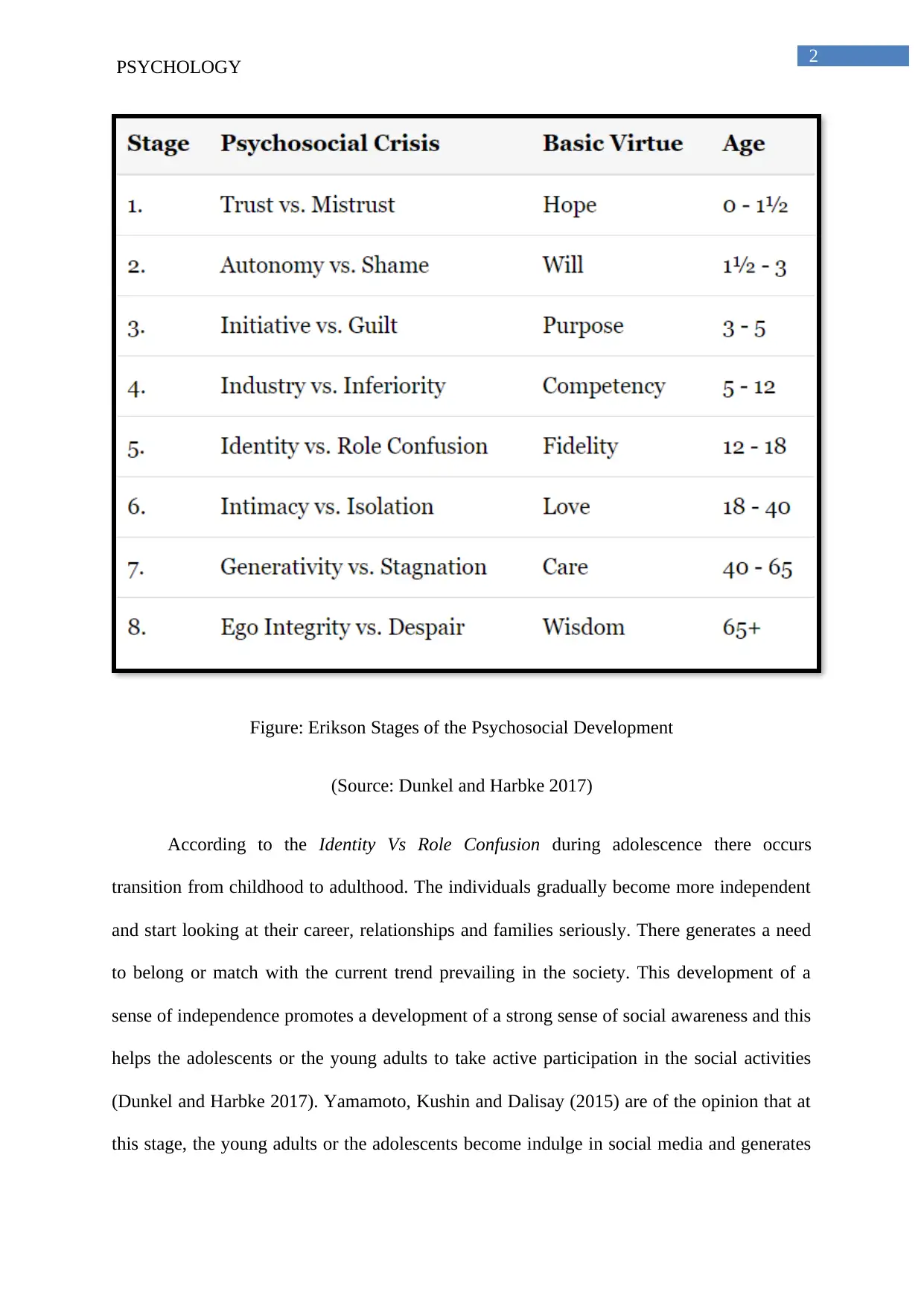
2
PSYCHOLOGY
Figure: Erikson Stages of the Psychosocial Development
(Source: Dunkel and Harbke 2017)
According to the Identity Vs Role Confusion during adolescence there occurs
transition from childhood to adulthood. The individuals gradually become more independent
and start looking at their career, relationships and families seriously. There generates a need
to belong or match with the current trend prevailing in the society. This development of a
sense of independence promotes a development of a strong sense of social awareness and this
helps the adolescents or the young adults to take active participation in the social activities
(Dunkel and Harbke 2017). Yamamoto, Kushin and Dalisay (2015) are of the opinion that at
this stage, the young adults or the adolescents become indulge in social media and generates
PSYCHOLOGY
Figure: Erikson Stages of the Psychosocial Development
(Source: Dunkel and Harbke 2017)
According to the Identity Vs Role Confusion during adolescence there occurs
transition from childhood to adulthood. The individuals gradually become more independent
and start looking at their career, relationships and families seriously. There generates a need
to belong or match with the current trend prevailing in the society. This development of a
sense of independence promotes a development of a strong sense of social awareness and this
helps the adolescents or the young adults to take active participation in the social activities
(Dunkel and Harbke 2017). Yamamoto, Kushin and Dalisay (2015) are of the opinion that at
this stage, the young adults or the adolescents become indulge in social media and generates
⊘ This is a preview!⊘
Do you want full access?
Subscribe today to unlock all pages.

Trusted by 1+ million students worldwide
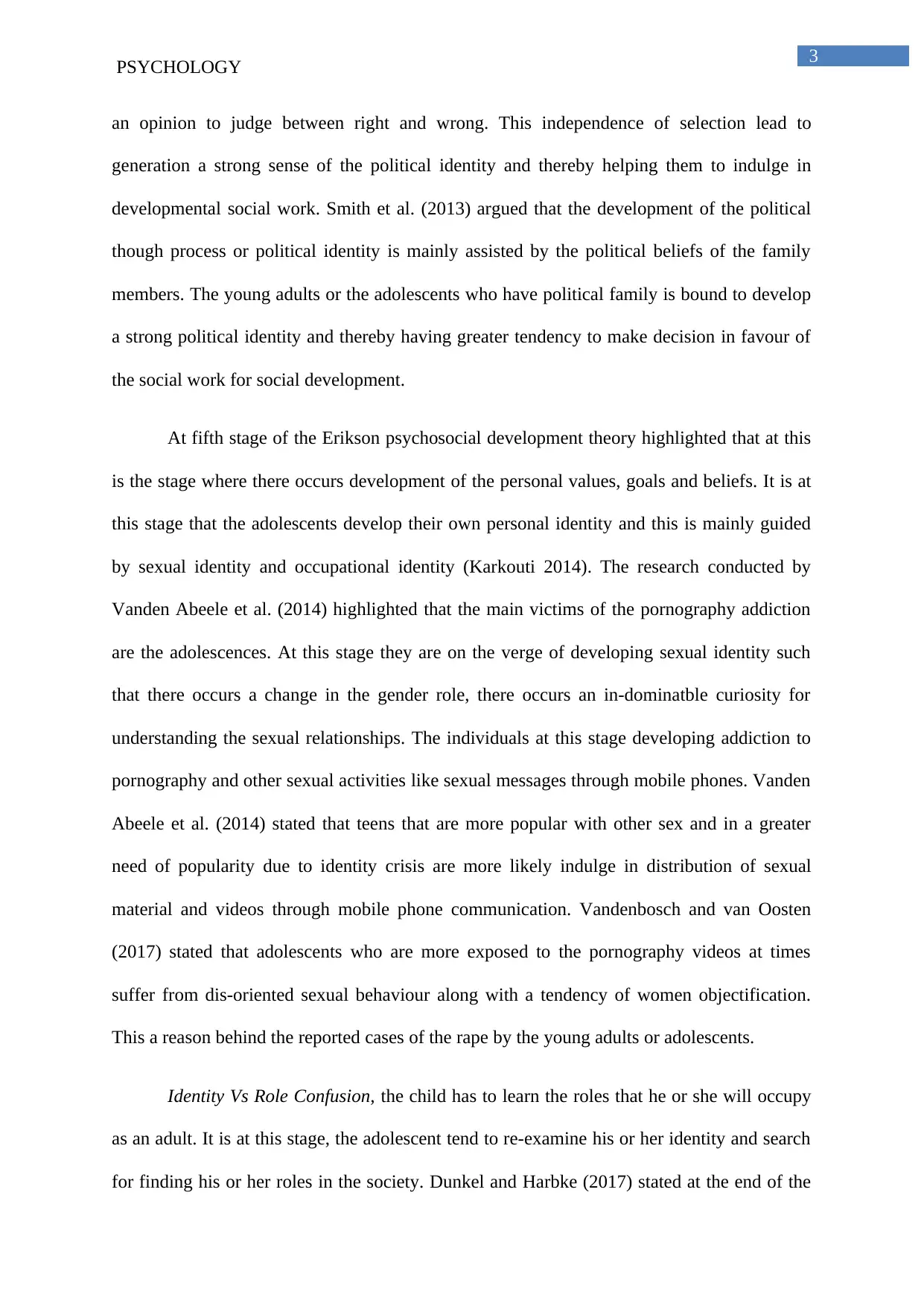
3
PSYCHOLOGY
an opinion to judge between right and wrong. This independence of selection lead to
generation a strong sense of the political identity and thereby helping them to indulge in
developmental social work. Smith et al. (2013) argued that the development of the political
though process or political identity is mainly assisted by the political beliefs of the family
members. The young adults or the adolescents who have political family is bound to develop
a strong political identity and thereby having greater tendency to make decision in favour of
the social work for social development.
At fifth stage of the Erikson psychosocial development theory highlighted that at this
is the stage where there occurs development of the personal values, goals and beliefs. It is at
this stage that the adolescents develop their own personal identity and this is mainly guided
by sexual identity and occupational identity (Karkouti 2014). The research conducted by
Vanden Abeele et al. (2014) highlighted that the main victims of the pornography addiction
are the adolescences. At this stage they are on the verge of developing sexual identity such
that there occurs a change in the gender role, there occurs an in-dominatble curiosity for
understanding the sexual relationships. The individuals at this stage developing addiction to
pornography and other sexual activities like sexual messages through mobile phones. Vanden
Abeele et al. (2014) stated that teens that are more popular with other sex and in a greater
need of popularity due to identity crisis are more likely indulge in distribution of sexual
material and videos through mobile phone communication. Vandenbosch and van Oosten
(2017) stated that adolescents who are more exposed to the pornography videos at times
suffer from dis-oriented sexual behaviour along with a tendency of women objectification.
This a reason behind the reported cases of the rape by the young adults or adolescents.
Identity Vs Role Confusion, the child has to learn the roles that he or she will occupy
as an adult. It is at this stage, the adolescent tend to re-examine his or her identity and search
for finding his or her roles in the society. Dunkel and Harbke (2017) stated at the end of the
PSYCHOLOGY
an opinion to judge between right and wrong. This independence of selection lead to
generation a strong sense of the political identity and thereby helping them to indulge in
developmental social work. Smith et al. (2013) argued that the development of the political
though process or political identity is mainly assisted by the political beliefs of the family
members. The young adults or the adolescents who have political family is bound to develop
a strong political identity and thereby having greater tendency to make decision in favour of
the social work for social development.
At fifth stage of the Erikson psychosocial development theory highlighted that at this
is the stage where there occurs development of the personal values, goals and beliefs. It is at
this stage that the adolescents develop their own personal identity and this is mainly guided
by sexual identity and occupational identity (Karkouti 2014). The research conducted by
Vanden Abeele et al. (2014) highlighted that the main victims of the pornography addiction
are the adolescences. At this stage they are on the verge of developing sexual identity such
that there occurs a change in the gender role, there occurs an in-dominatble curiosity for
understanding the sexual relationships. The individuals at this stage developing addiction to
pornography and other sexual activities like sexual messages through mobile phones. Vanden
Abeele et al. (2014) stated that teens that are more popular with other sex and in a greater
need of popularity due to identity crisis are more likely indulge in distribution of sexual
material and videos through mobile phone communication. Vandenbosch and van Oosten
(2017) stated that adolescents who are more exposed to the pornography videos at times
suffer from dis-oriented sexual behaviour along with a tendency of women objectification.
This a reason behind the reported cases of the rape by the young adults or adolescents.
Identity Vs Role Confusion, the child has to learn the roles that he or she will occupy
as an adult. It is at this stage, the adolescent tend to re-examine his or her identity and search
for finding his or her roles in the society. Dunkel and Harbke (2017) stated at the end of the
Paraphrase This Document
Need a fresh take? Get an instant paraphrase of this document with our AI Paraphraser
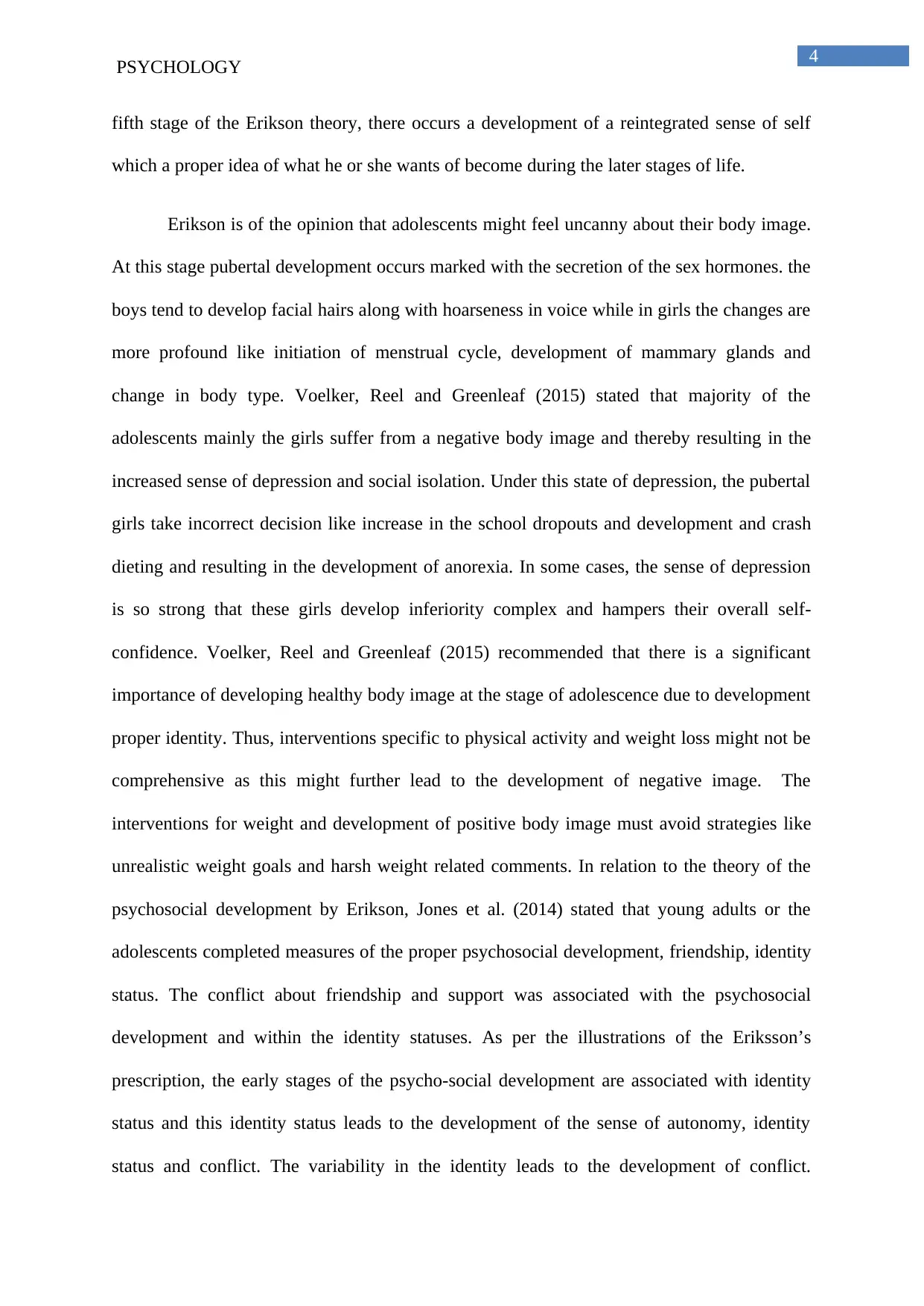
4
PSYCHOLOGY
fifth stage of the Erikson theory, there occurs a development of a reintegrated sense of self
which a proper idea of what he or she wants of become during the later stages of life.
Erikson is of the opinion that adolescents might feel uncanny about their body image.
At this stage pubertal development occurs marked with the secretion of the sex hormones. the
boys tend to develop facial hairs along with hoarseness in voice while in girls the changes are
more profound like initiation of menstrual cycle, development of mammary glands and
change in body type. Voelker, Reel and Greenleaf (2015) stated that majority of the
adolescents mainly the girls suffer from a negative body image and thereby resulting in the
increased sense of depression and social isolation. Under this state of depression, the pubertal
girls take incorrect decision like increase in the school dropouts and development and crash
dieting and resulting in the development of anorexia. In some cases, the sense of depression
is so strong that these girls develop inferiority complex and hampers their overall self-
confidence. Voelker, Reel and Greenleaf (2015) recommended that there is a significant
importance of developing healthy body image at the stage of adolescence due to development
proper identity. Thus, interventions specific to physical activity and weight loss might not be
comprehensive as this might further lead to the development of negative image. The
interventions for weight and development of positive body image must avoid strategies like
unrealistic weight goals and harsh weight related comments. In relation to the theory of the
psychosocial development by Erikson, Jones et al. (2014) stated that young adults or the
adolescents completed measures of the proper psychosocial development, friendship, identity
status. The conflict about friendship and support was associated with the psychosocial
development and within the identity statuses. As per the illustrations of the Eriksson’s
prescription, the early stages of the psycho-social development are associated with identity
status and this identity status leads to the development of the sense of autonomy, identity
status and conflict. The variability in the identity leads to the development of conflict.
PSYCHOLOGY
fifth stage of the Erikson theory, there occurs a development of a reintegrated sense of self
which a proper idea of what he or she wants of become during the later stages of life.
Erikson is of the opinion that adolescents might feel uncanny about their body image.
At this stage pubertal development occurs marked with the secretion of the sex hormones. the
boys tend to develop facial hairs along with hoarseness in voice while in girls the changes are
more profound like initiation of menstrual cycle, development of mammary glands and
change in body type. Voelker, Reel and Greenleaf (2015) stated that majority of the
adolescents mainly the girls suffer from a negative body image and thereby resulting in the
increased sense of depression and social isolation. Under this state of depression, the pubertal
girls take incorrect decision like increase in the school dropouts and development and crash
dieting and resulting in the development of anorexia. In some cases, the sense of depression
is so strong that these girls develop inferiority complex and hampers their overall self-
confidence. Voelker, Reel and Greenleaf (2015) recommended that there is a significant
importance of developing healthy body image at the stage of adolescence due to development
proper identity. Thus, interventions specific to physical activity and weight loss might not be
comprehensive as this might further lead to the development of negative image. The
interventions for weight and development of positive body image must avoid strategies like
unrealistic weight goals and harsh weight related comments. In relation to the theory of the
psychosocial development by Erikson, Jones et al. (2014) stated that young adults or the
adolescents completed measures of the proper psychosocial development, friendship, identity
status. The conflict about friendship and support was associated with the psychosocial
development and within the identity statuses. As per the illustrations of the Eriksson’s
prescription, the early stages of the psycho-social development are associated with identity
status and this identity status leads to the development of the sense of autonomy, identity
status and conflict. The variability in the identity leads to the development of conflict.
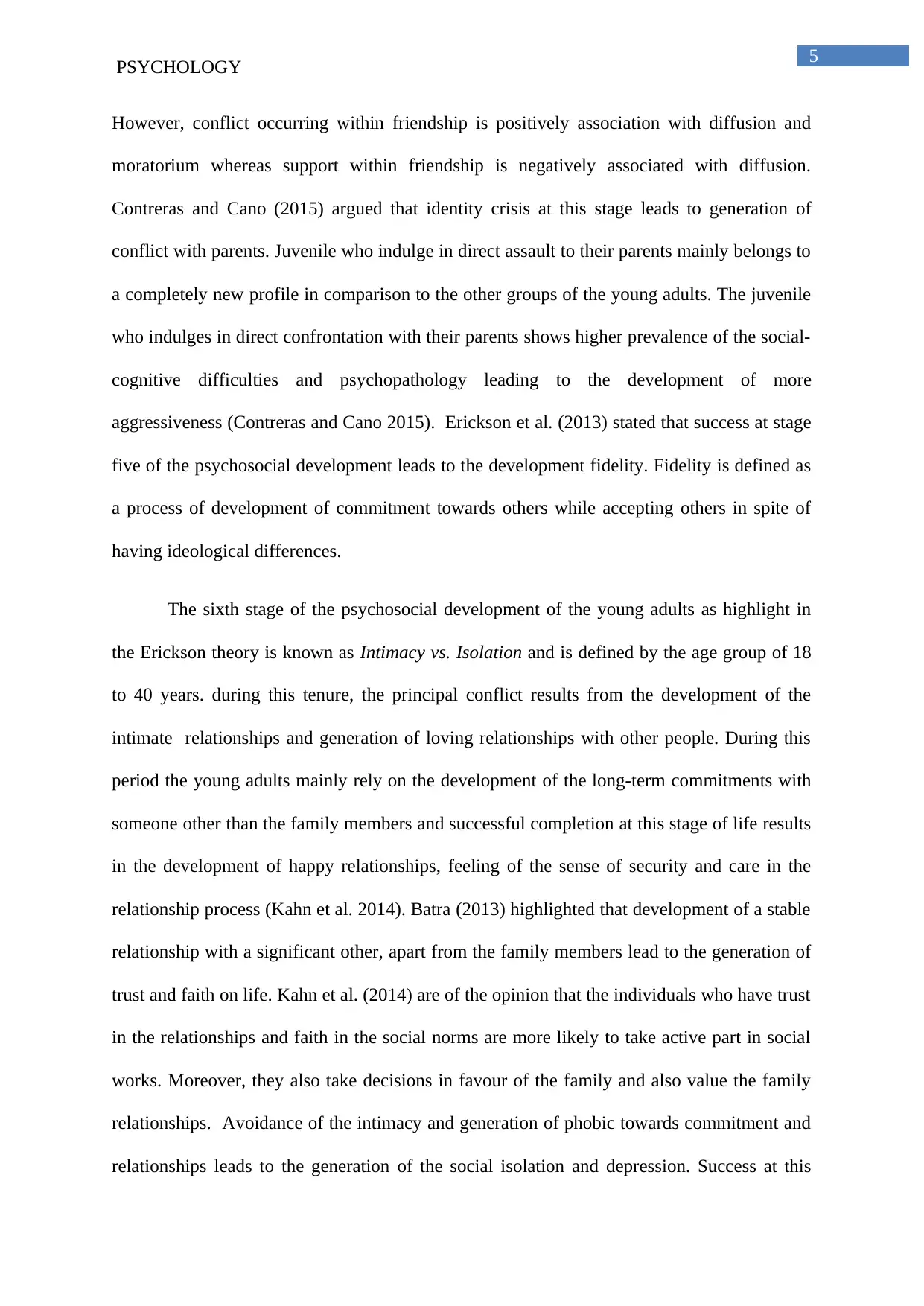
5
PSYCHOLOGY
However, conflict occurring within friendship is positively association with diffusion and
moratorium whereas support within friendship is negatively associated with diffusion.
Contreras and Cano (2015) argued that identity crisis at this stage leads to generation of
conflict with parents. Juvenile who indulge in direct assault to their parents mainly belongs to
a completely new profile in comparison to the other groups of the young adults. The juvenile
who indulges in direct confrontation with their parents shows higher prevalence of the social-
cognitive difficulties and psychopathology leading to the development of more
aggressiveness (Contreras and Cano 2015). Erickson et al. (2013) stated that success at stage
five of the psychosocial development leads to the development fidelity. Fidelity is defined as
a process of development of commitment towards others while accepting others in spite of
having ideological differences.
The sixth stage of the psychosocial development of the young adults as highlight in
the Erickson theory is known as Intimacy vs. Isolation and is defined by the age group of 18
to 40 years. during this tenure, the principal conflict results from the development of the
intimate relationships and generation of loving relationships with other people. During this
period the young adults mainly rely on the development of the long-term commitments with
someone other than the family members and successful completion at this stage of life results
in the development of happy relationships, feeling of the sense of security and care in the
relationship process (Kahn et al. 2014). Batra (2013) highlighted that development of a stable
relationship with a significant other, apart from the family members lead to the generation of
trust and faith on life. Kahn et al. (2014) are of the opinion that the individuals who have trust
in the relationships and faith in the social norms are more likely to take active part in social
works. Moreover, they also take decisions in favour of the family and also value the family
relationships. Avoidance of the intimacy and generation of phobic towards commitment and
relationships leads to the generation of the social isolation and depression. Success at this
PSYCHOLOGY
However, conflict occurring within friendship is positively association with diffusion and
moratorium whereas support within friendship is negatively associated with diffusion.
Contreras and Cano (2015) argued that identity crisis at this stage leads to generation of
conflict with parents. Juvenile who indulge in direct assault to their parents mainly belongs to
a completely new profile in comparison to the other groups of the young adults. The juvenile
who indulges in direct confrontation with their parents shows higher prevalence of the social-
cognitive difficulties and psychopathology leading to the development of more
aggressiveness (Contreras and Cano 2015). Erickson et al. (2013) stated that success at stage
five of the psychosocial development leads to the development fidelity. Fidelity is defined as
a process of development of commitment towards others while accepting others in spite of
having ideological differences.
The sixth stage of the psychosocial development of the young adults as highlight in
the Erickson theory is known as Intimacy vs. Isolation and is defined by the age group of 18
to 40 years. during this tenure, the principal conflict results from the development of the
intimate relationships and generation of loving relationships with other people. During this
period the young adults mainly rely on the development of the long-term commitments with
someone other than the family members and successful completion at this stage of life results
in the development of happy relationships, feeling of the sense of security and care in the
relationship process (Kahn et al. 2014). Batra (2013) highlighted that development of a stable
relationship with a significant other, apart from the family members lead to the generation of
trust and faith on life. Kahn et al. (2014) are of the opinion that the individuals who have trust
in the relationships and faith in the social norms are more likely to take active part in social
works. Moreover, they also take decisions in favour of the family and also value the family
relationships. Avoidance of the intimacy and generation of phobic towards commitment and
relationships leads to the generation of the social isolation and depression. Success at this
⊘ This is a preview!⊘
Do you want full access?
Subscribe today to unlock all pages.

Trusted by 1+ million students worldwide
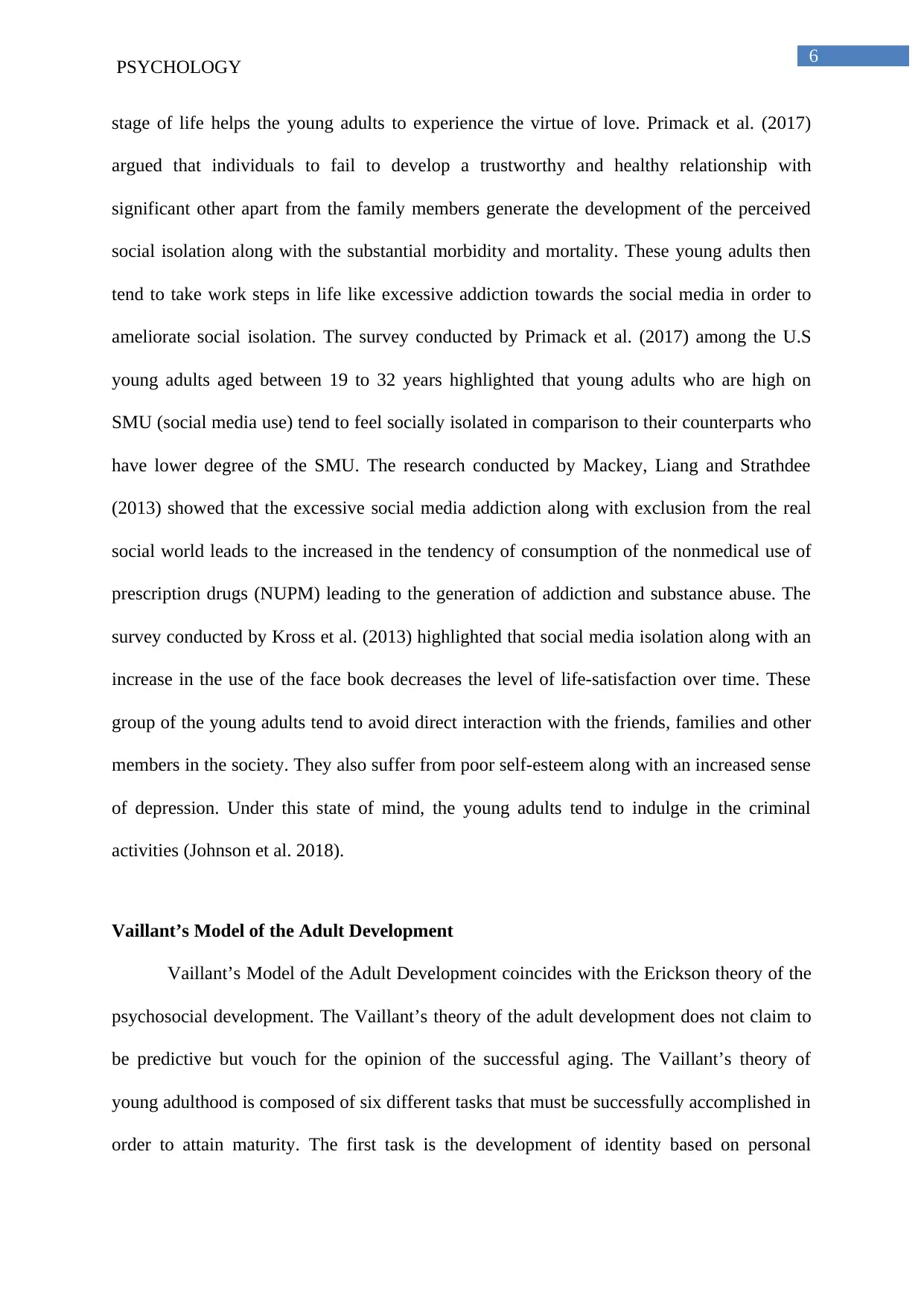
6
PSYCHOLOGY
stage of life helps the young adults to experience the virtue of love. Primack et al. (2017)
argued that individuals to fail to develop a trustworthy and healthy relationship with
significant other apart from the family members generate the development of the perceived
social isolation along with the substantial morbidity and mortality. These young adults then
tend to take work steps in life like excessive addiction towards the social media in order to
ameliorate social isolation. The survey conducted by Primack et al. (2017) among the U.S
young adults aged between 19 to 32 years highlighted that young adults who are high on
SMU (social media use) tend to feel socially isolated in comparison to their counterparts who
have lower degree of the SMU. The research conducted by Mackey, Liang and Strathdee
(2013) showed that the excessive social media addiction along with exclusion from the real
social world leads to the increased in the tendency of consumption of the nonmedical use of
prescription drugs (NUPM) leading to the generation of addiction and substance abuse. The
survey conducted by Kross et al. (2013) highlighted that social media isolation along with an
increase in the use of the face book decreases the level of life-satisfaction over time. These
group of the young adults tend to avoid direct interaction with the friends, families and other
members in the society. They also suffer from poor self-esteem along with an increased sense
of depression. Under this state of mind, the young adults tend to indulge in the criminal
activities (Johnson et al. 2018).
Vaillant’s Model of the Adult Development
Vaillant’s Model of the Adult Development coincides with the Erickson theory of the
psychosocial development. The Vaillant’s theory of the adult development does not claim to
be predictive but vouch for the opinion of the successful aging. The Vaillant’s theory of
young adulthood is composed of six different tasks that must be successfully accomplished in
order to attain maturity. The first task is the development of identity based on personal
PSYCHOLOGY
stage of life helps the young adults to experience the virtue of love. Primack et al. (2017)
argued that individuals to fail to develop a trustworthy and healthy relationship with
significant other apart from the family members generate the development of the perceived
social isolation along with the substantial morbidity and mortality. These young adults then
tend to take work steps in life like excessive addiction towards the social media in order to
ameliorate social isolation. The survey conducted by Primack et al. (2017) among the U.S
young adults aged between 19 to 32 years highlighted that young adults who are high on
SMU (social media use) tend to feel socially isolated in comparison to their counterparts who
have lower degree of the SMU. The research conducted by Mackey, Liang and Strathdee
(2013) showed that the excessive social media addiction along with exclusion from the real
social world leads to the increased in the tendency of consumption of the nonmedical use of
prescription drugs (NUPM) leading to the generation of addiction and substance abuse. The
survey conducted by Kross et al. (2013) highlighted that social media isolation along with an
increase in the use of the face book decreases the level of life-satisfaction over time. These
group of the young adults tend to avoid direct interaction with the friends, families and other
members in the society. They also suffer from poor self-esteem along with an increased sense
of depression. Under this state of mind, the young adults tend to indulge in the criminal
activities (Johnson et al. 2018).
Vaillant’s Model of the Adult Development
Vaillant’s Model of the Adult Development coincides with the Erickson theory of the
psychosocial development. The Vaillant’s theory of the adult development does not claim to
be predictive but vouch for the opinion of the successful aging. The Vaillant’s theory of
young adulthood is composed of six different tasks that must be successfully accomplished in
order to attain maturity. The first task is the development of identity based on personal
Paraphrase This Document
Need a fresh take? Get an instant paraphrase of this document with our AI Paraphraser
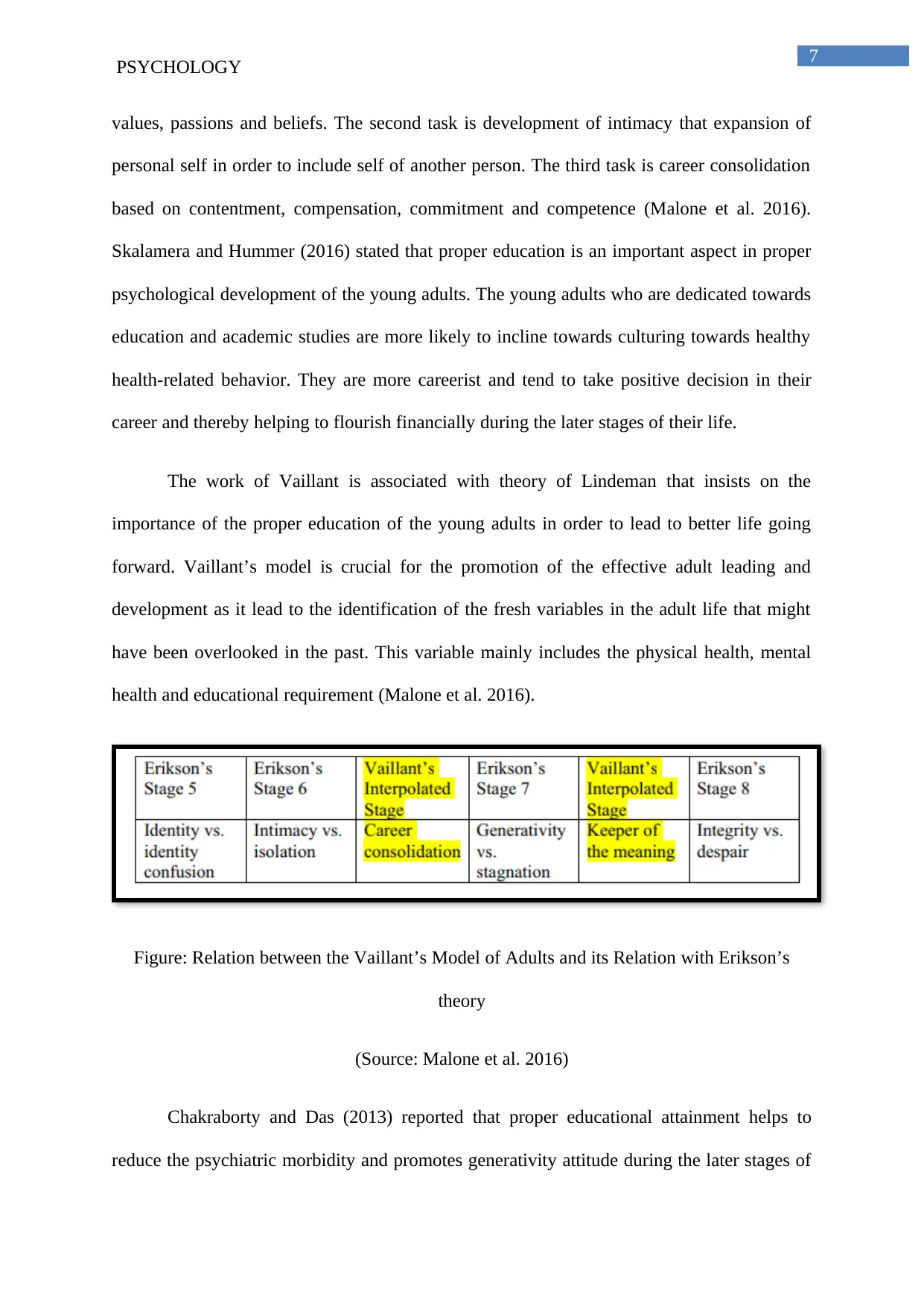
7
PSYCHOLOGY
values, passions and beliefs. The second task is development of intimacy that expansion of
personal self in order to include self of another person. The third task is career consolidation
based on contentment, compensation, commitment and competence (Malone et al. 2016).
Skalamera and Hummer (2016) stated that proper education is an important aspect in proper
psychological development of the young adults. The young adults who are dedicated towards
education and academic studies are more likely to incline towards culturing towards healthy
health-related behavior. They are more careerist and tend to take positive decision in their
career and thereby helping to flourish financially during the later stages of their life.
The work of Vaillant is associated with theory of Lindeman that insists on the
importance of the proper education of the young adults in order to lead to better life going
forward. Vaillant’s model is crucial for the promotion of the effective adult leading and
development as it lead to the identification of the fresh variables in the adult life that might
have been overlooked in the past. This variable mainly includes the physical health, mental
health and educational requirement (Malone et al. 2016).
Figure: Relation between the Vaillant’s Model of Adults and its Relation with Erikson’s
theory
(Source: Malone et al. 2016)
Chakraborty and Das (2013) reported that proper educational attainment helps to
reduce the psychiatric morbidity and promotes generativity attitude during the later stages of
PSYCHOLOGY
values, passions and beliefs. The second task is development of intimacy that expansion of
personal self in order to include self of another person. The third task is career consolidation
based on contentment, compensation, commitment and competence (Malone et al. 2016).
Skalamera and Hummer (2016) stated that proper education is an important aspect in proper
psychological development of the young adults. The young adults who are dedicated towards
education and academic studies are more likely to incline towards culturing towards healthy
health-related behavior. They are more careerist and tend to take positive decision in their
career and thereby helping to flourish financially during the later stages of their life.
The work of Vaillant is associated with theory of Lindeman that insists on the
importance of the proper education of the young adults in order to lead to better life going
forward. Vaillant’s model is crucial for the promotion of the effective adult leading and
development as it lead to the identification of the fresh variables in the adult life that might
have been overlooked in the past. This variable mainly includes the physical health, mental
health and educational requirement (Malone et al. 2016).
Figure: Relation between the Vaillant’s Model of Adults and its Relation with Erikson’s
theory
(Source: Malone et al. 2016)
Chakraborty and Das (2013) reported that proper educational attainment helps to
reduce the psychiatric morbidity and promotes generativity attitude during the later stages of
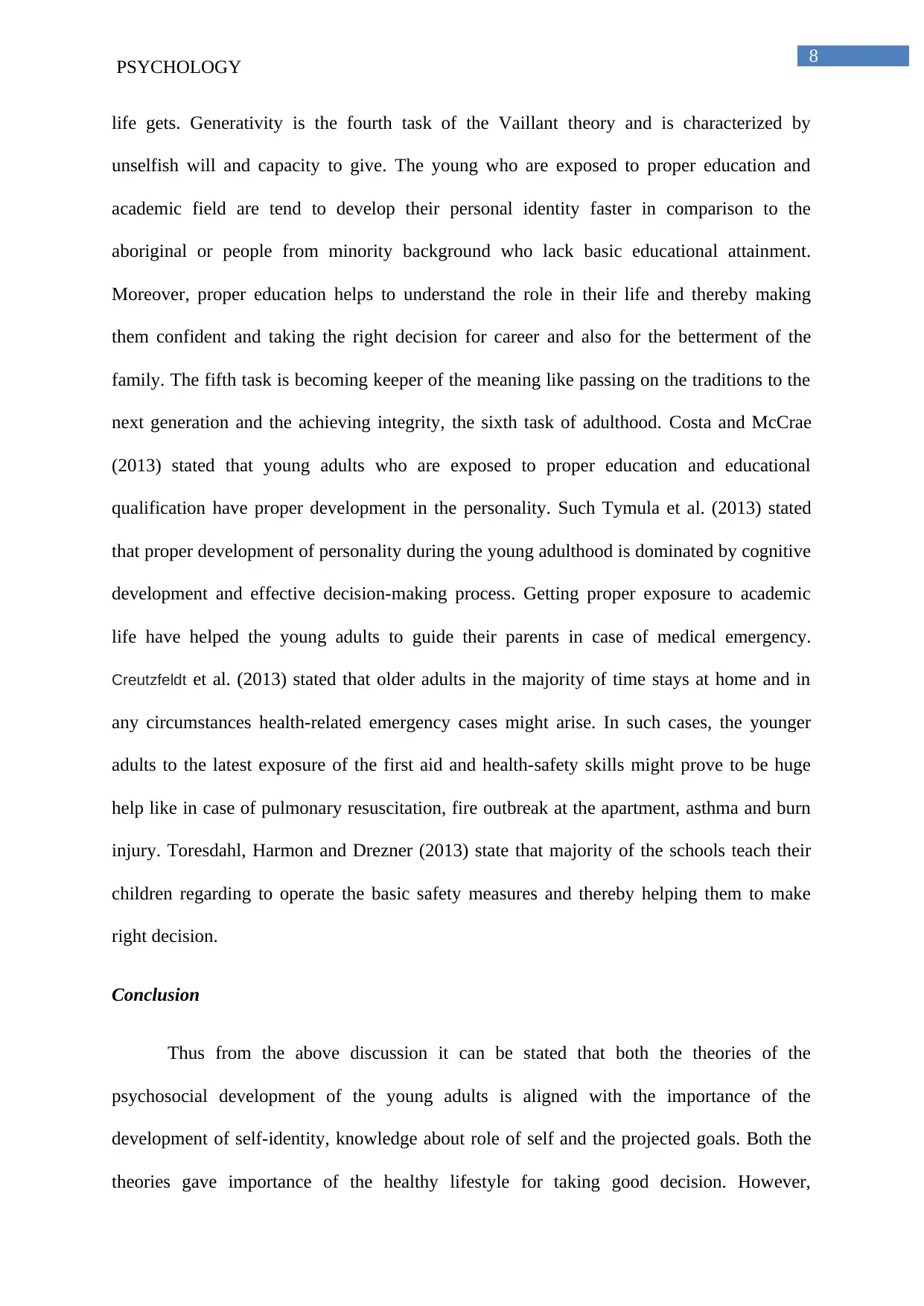
8
PSYCHOLOGY
life gets. Generativity is the fourth task of the Vaillant theory and is characterized by
unselfish will and capacity to give. The young who are exposed to proper education and
academic field are tend to develop their personal identity faster in comparison to the
aboriginal or people from minority background who lack basic educational attainment.
Moreover, proper education helps to understand the role in their life and thereby making
them confident and taking the right decision for career and also for the betterment of the
family. The fifth task is becoming keeper of the meaning like passing on the traditions to the
next generation and the achieving integrity, the sixth task of adulthood. Costa and McCrae
(2013) stated that young adults who are exposed to proper education and educational
qualification have proper development in the personality. Such Tymula et al. (2013) stated
that proper development of personality during the young adulthood is dominated by cognitive
development and effective decision-making process. Getting proper exposure to academic
life have helped the young adults to guide their parents in case of medical emergency.
Creutzfeldt et al. (2013) stated that older adults in the majority of time stays at home and in
any circumstances health-related emergency cases might arise. In such cases, the younger
adults to the latest exposure of the first aid and health-safety skills might prove to be huge
help like in case of pulmonary resuscitation, fire outbreak at the apartment, asthma and burn
injury. Toresdahl, Harmon and Drezner (2013) state that majority of the schools teach their
children regarding to operate the basic safety measures and thereby helping them to make
right decision.
Conclusion
Thus from the above discussion it can be stated that both the theories of the
psychosocial development of the young adults is aligned with the importance of the
development of self-identity, knowledge about role of self and the projected goals. Both the
theories gave importance of the healthy lifestyle for taking good decision. However,
PSYCHOLOGY
life gets. Generativity is the fourth task of the Vaillant theory and is characterized by
unselfish will and capacity to give. The young who are exposed to proper education and
academic field are tend to develop their personal identity faster in comparison to the
aboriginal or people from minority background who lack basic educational attainment.
Moreover, proper education helps to understand the role in their life and thereby making
them confident and taking the right decision for career and also for the betterment of the
family. The fifth task is becoming keeper of the meaning like passing on the traditions to the
next generation and the achieving integrity, the sixth task of adulthood. Costa and McCrae
(2013) stated that young adults who are exposed to proper education and educational
qualification have proper development in the personality. Such Tymula et al. (2013) stated
that proper development of personality during the young adulthood is dominated by cognitive
development and effective decision-making process. Getting proper exposure to academic
life have helped the young adults to guide their parents in case of medical emergency.
Creutzfeldt et al. (2013) stated that older adults in the majority of time stays at home and in
any circumstances health-related emergency cases might arise. In such cases, the younger
adults to the latest exposure of the first aid and health-safety skills might prove to be huge
help like in case of pulmonary resuscitation, fire outbreak at the apartment, asthma and burn
injury. Toresdahl, Harmon and Drezner (2013) state that majority of the schools teach their
children regarding to operate the basic safety measures and thereby helping them to make
right decision.
Conclusion
Thus from the above discussion it can be stated that both the theories of the
psychosocial development of the young adults is aligned with the importance of the
development of self-identity, knowledge about role of self and the projected goals. Both the
theories gave importance of the healthy lifestyle for taking good decision. However,
⊘ This is a preview!⊘
Do you want full access?
Subscribe today to unlock all pages.

Trusted by 1+ million students worldwide
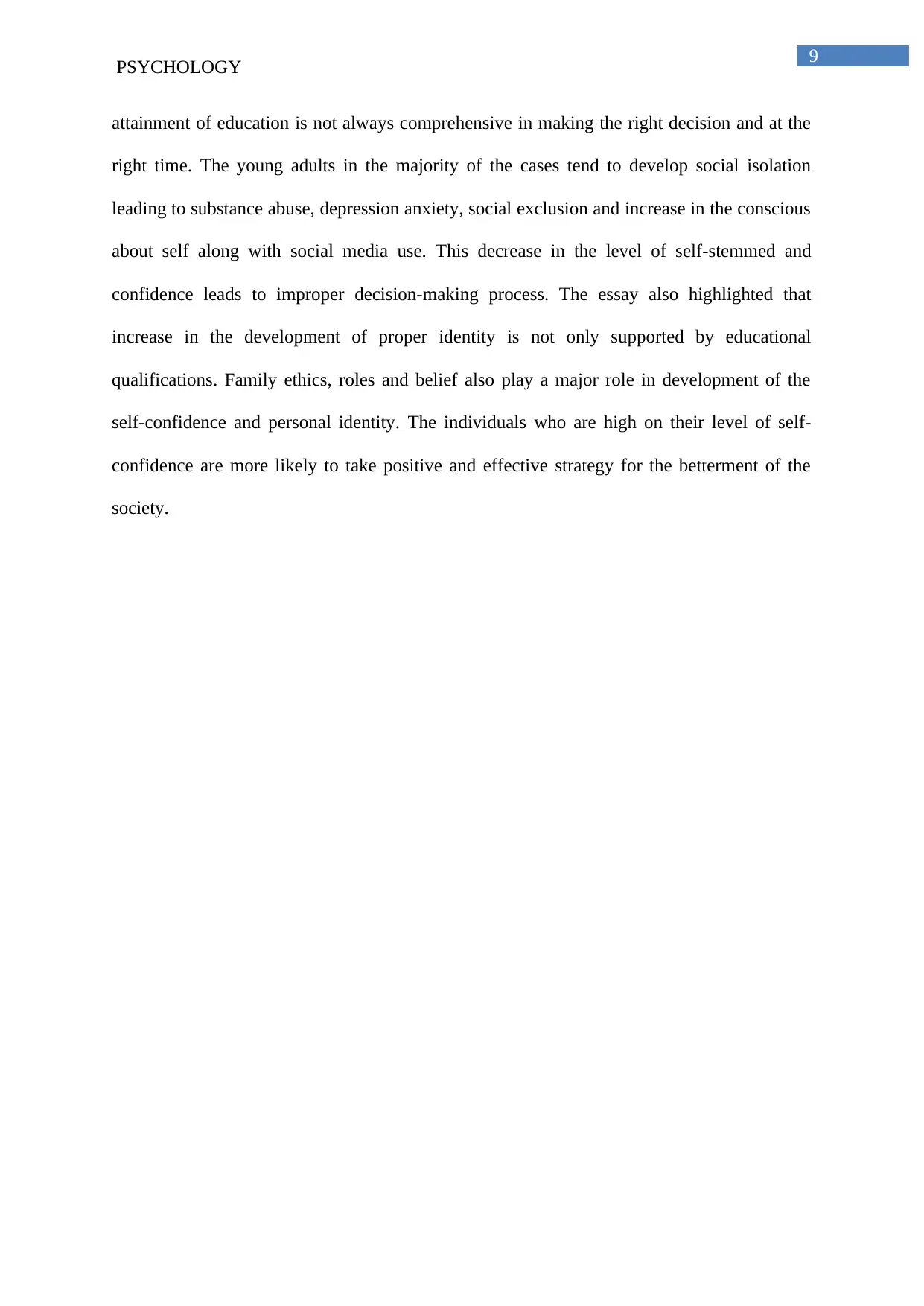
9
PSYCHOLOGY
attainment of education is not always comprehensive in making the right decision and at the
right time. The young adults in the majority of the cases tend to develop social isolation
leading to substance abuse, depression anxiety, social exclusion and increase in the conscious
about self along with social media use. This decrease in the level of self-stemmed and
confidence leads to improper decision-making process. The essay also highlighted that
increase in the development of proper identity is not only supported by educational
qualifications. Family ethics, roles and belief also play a major role in development of the
self-confidence and personal identity. The individuals who are high on their level of self-
confidence are more likely to take positive and effective strategy for the betterment of the
society.
PSYCHOLOGY
attainment of education is not always comprehensive in making the right decision and at the
right time. The young adults in the majority of the cases tend to develop social isolation
leading to substance abuse, depression anxiety, social exclusion and increase in the conscious
about self along with social media use. This decrease in the level of self-stemmed and
confidence leads to improper decision-making process. The essay also highlighted that
increase in the development of proper identity is not only supported by educational
qualifications. Family ethics, roles and belief also play a major role in development of the
self-confidence and personal identity. The individuals who are high on their level of self-
confidence are more likely to take positive and effective strategy for the betterment of the
society.
Paraphrase This Document
Need a fresh take? Get an instant paraphrase of this document with our AI Paraphraser
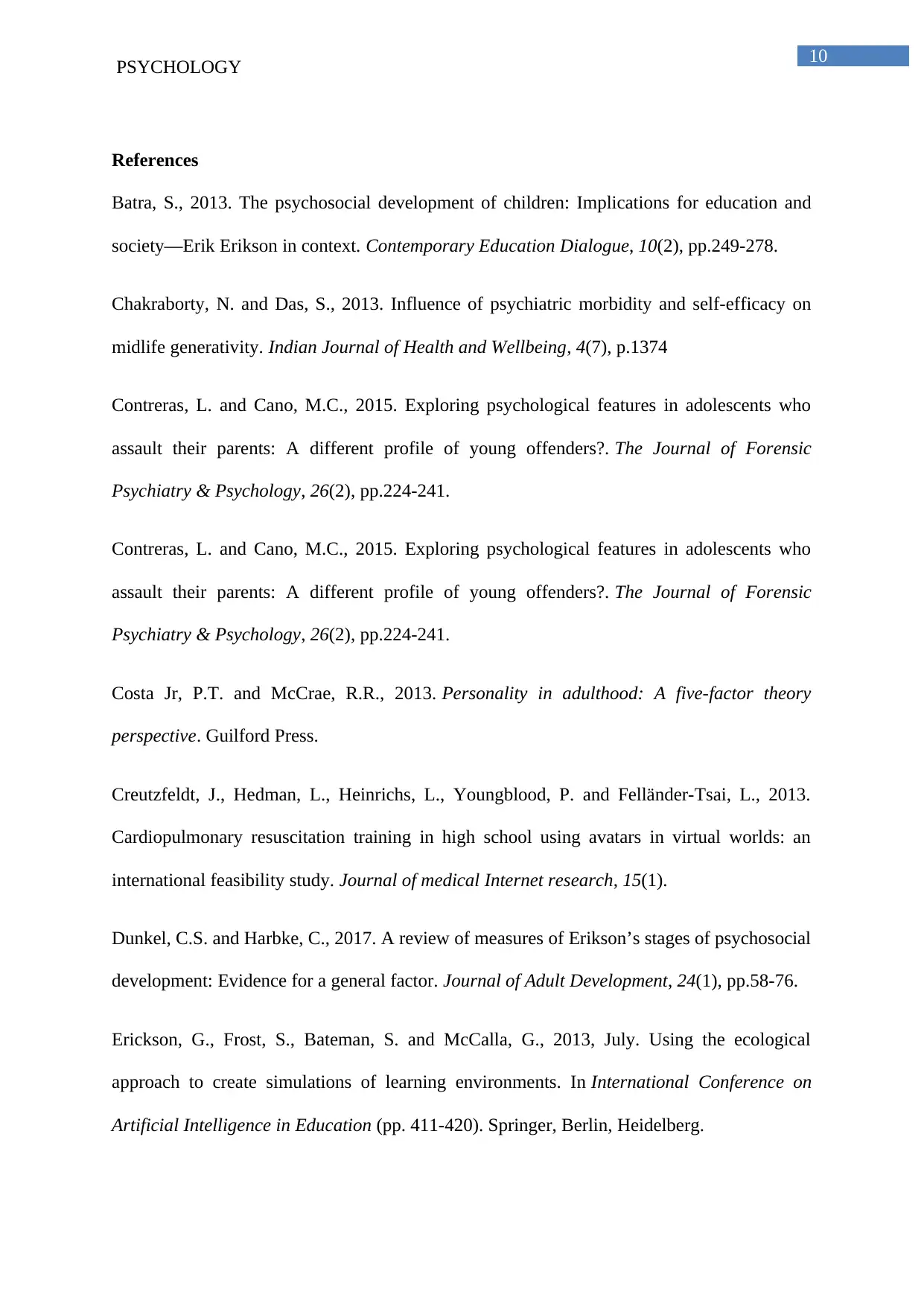
10
PSYCHOLOGY
References
Batra, S., 2013. The psychosocial development of children: Implications for education and
society—Erik Erikson in context. Contemporary Education Dialogue, 10(2), pp.249-278.
Chakraborty, N. and Das, S., 2013. Influence of psychiatric morbidity and self-efficacy on
midlife generativity. Indian Journal of Health and Wellbeing, 4(7), p.1374
Contreras, L. and Cano, M.C., 2015. Exploring psychological features in adolescents who
assault their parents: A different profile of young offenders?. The Journal of Forensic
Psychiatry & Psychology, 26(2), pp.224-241.
Contreras, L. and Cano, M.C., 2015. Exploring psychological features in adolescents who
assault their parents: A different profile of young offenders?. The Journal of Forensic
Psychiatry & Psychology, 26(2), pp.224-241.
Costa Jr, P.T. and McCrae, R.R., 2013. Personality in adulthood: A five-factor theory
perspective. Guilford Press.
Creutzfeldt, J., Hedman, L., Heinrichs, L., Youngblood, P. and Felländer-Tsai, L., 2013.
Cardiopulmonary resuscitation training in high school using avatars in virtual worlds: an
international feasibility study. Journal of medical Internet research, 15(1).
Dunkel, C.S. and Harbke, C., 2017. A review of measures of Erikson’s stages of psychosocial
development: Evidence for a general factor. Journal of Adult Development, 24(1), pp.58-76.
Erickson, G., Frost, S., Bateman, S. and McCalla, G., 2013, July. Using the ecological
approach to create simulations of learning environments. In International Conference on
Artificial Intelligence in Education (pp. 411-420). Springer, Berlin, Heidelberg.
PSYCHOLOGY
References
Batra, S., 2013. The psychosocial development of children: Implications for education and
society—Erik Erikson in context. Contemporary Education Dialogue, 10(2), pp.249-278.
Chakraborty, N. and Das, S., 2013. Influence of psychiatric morbidity and self-efficacy on
midlife generativity. Indian Journal of Health and Wellbeing, 4(7), p.1374
Contreras, L. and Cano, M.C., 2015. Exploring psychological features in adolescents who
assault their parents: A different profile of young offenders?. The Journal of Forensic
Psychiatry & Psychology, 26(2), pp.224-241.
Contreras, L. and Cano, M.C., 2015. Exploring psychological features in adolescents who
assault their parents: A different profile of young offenders?. The Journal of Forensic
Psychiatry & Psychology, 26(2), pp.224-241.
Costa Jr, P.T. and McCrae, R.R., 2013. Personality in adulthood: A five-factor theory
perspective. Guilford Press.
Creutzfeldt, J., Hedman, L., Heinrichs, L., Youngblood, P. and Felländer-Tsai, L., 2013.
Cardiopulmonary resuscitation training in high school using avatars in virtual worlds: an
international feasibility study. Journal of medical Internet research, 15(1).
Dunkel, C.S. and Harbke, C., 2017. A review of measures of Erikson’s stages of psychosocial
development: Evidence for a general factor. Journal of Adult Development, 24(1), pp.58-76.
Erickson, G., Frost, S., Bateman, S. and McCalla, G., 2013, July. Using the ecological
approach to create simulations of learning environments. In International Conference on
Artificial Intelligence in Education (pp. 411-420). Springer, Berlin, Heidelberg.
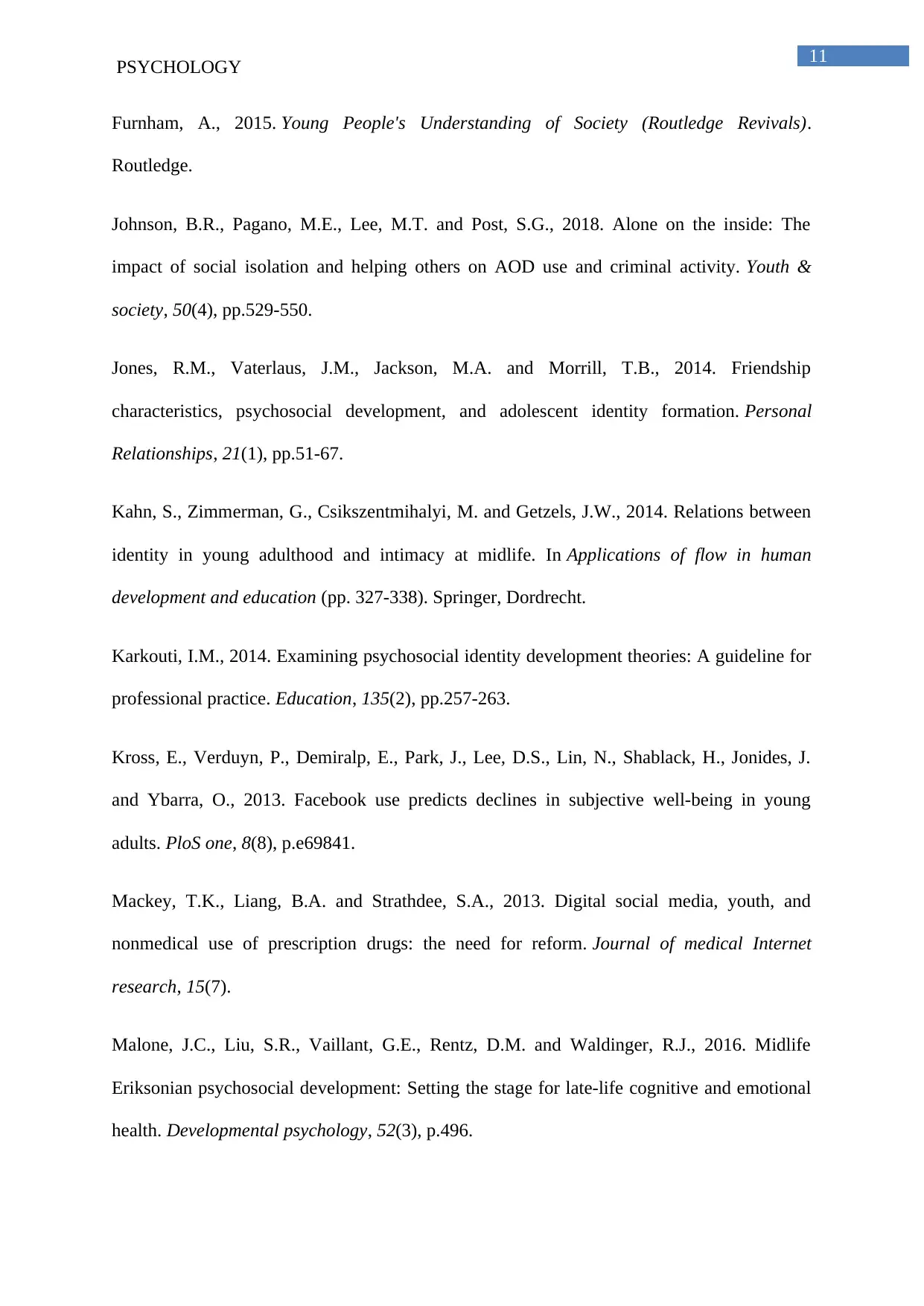
11
PSYCHOLOGY
Furnham, A., 2015. Young People's Understanding of Society (Routledge Revivals).
Routledge.
Johnson, B.R., Pagano, M.E., Lee, M.T. and Post, S.G., 2018. Alone on the inside: The
impact of social isolation and helping others on AOD use and criminal activity. Youth &
society, 50(4), pp.529-550.
Jones, R.M., Vaterlaus, J.M., Jackson, M.A. and Morrill, T.B., 2014. Friendship
characteristics, psychosocial development, and adolescent identity formation. Personal
Relationships, 21(1), pp.51-67.
Kahn, S., Zimmerman, G., Csikszentmihalyi, M. and Getzels, J.W., 2014. Relations between
identity in young adulthood and intimacy at midlife. In Applications of flow in human
development and education (pp. 327-338). Springer, Dordrecht.
Karkouti, I.M., 2014. Examining psychosocial identity development theories: A guideline for
professional practice. Education, 135(2), pp.257-263.
Kross, E., Verduyn, P., Demiralp, E., Park, J., Lee, D.S., Lin, N., Shablack, H., Jonides, J.
and Ybarra, O., 2013. Facebook use predicts declines in subjective well-being in young
adults. PloS one, 8(8), p.e69841.
Mackey, T.K., Liang, B.A. and Strathdee, S.A., 2013. Digital social media, youth, and
nonmedical use of prescription drugs: the need for reform. Journal of medical Internet
research, 15(7).
Malone, J.C., Liu, S.R., Vaillant, G.E., Rentz, D.M. and Waldinger, R.J., 2016. Midlife
Eriksonian psychosocial development: Setting the stage for late-life cognitive and emotional
health. Developmental psychology, 52(3), p.496.
PSYCHOLOGY
Furnham, A., 2015. Young People's Understanding of Society (Routledge Revivals).
Routledge.
Johnson, B.R., Pagano, M.E., Lee, M.T. and Post, S.G., 2018. Alone on the inside: The
impact of social isolation and helping others on AOD use and criminal activity. Youth &
society, 50(4), pp.529-550.
Jones, R.M., Vaterlaus, J.M., Jackson, M.A. and Morrill, T.B., 2014. Friendship
characteristics, psychosocial development, and adolescent identity formation. Personal
Relationships, 21(1), pp.51-67.
Kahn, S., Zimmerman, G., Csikszentmihalyi, M. and Getzels, J.W., 2014. Relations between
identity in young adulthood and intimacy at midlife. In Applications of flow in human
development and education (pp. 327-338). Springer, Dordrecht.
Karkouti, I.M., 2014. Examining psychosocial identity development theories: A guideline for
professional practice. Education, 135(2), pp.257-263.
Kross, E., Verduyn, P., Demiralp, E., Park, J., Lee, D.S., Lin, N., Shablack, H., Jonides, J.
and Ybarra, O., 2013. Facebook use predicts declines in subjective well-being in young
adults. PloS one, 8(8), p.e69841.
Mackey, T.K., Liang, B.A. and Strathdee, S.A., 2013. Digital social media, youth, and
nonmedical use of prescription drugs: the need for reform. Journal of medical Internet
research, 15(7).
Malone, J.C., Liu, S.R., Vaillant, G.E., Rentz, D.M. and Waldinger, R.J., 2016. Midlife
Eriksonian psychosocial development: Setting the stage for late-life cognitive and emotional
health. Developmental psychology, 52(3), p.496.
⊘ This is a preview!⊘
Do you want full access?
Subscribe today to unlock all pages.

Trusted by 1+ million students worldwide
1 out of 14
Related Documents
Your All-in-One AI-Powered Toolkit for Academic Success.
+13062052269
info@desklib.com
Available 24*7 on WhatsApp / Email
![[object Object]](/_next/static/media/star-bottom.7253800d.svg)
Unlock your academic potential
Copyright © 2020–2025 A2Z Services. All Rights Reserved. Developed and managed by ZUCOL.





